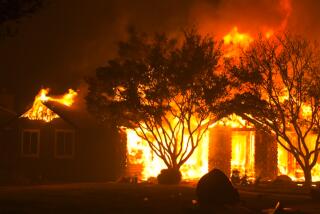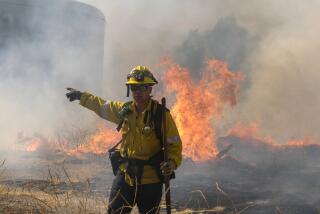Give Board Deadline to Fix Roof
- Share via
Question: My condominium unit is on the top floor of the building. The roof is common area. For the last two years, the roof leaks every time it rains. The ceiling and paint in our unit have been damaged, and I have begged the board of directors to repair the problem before the next rainy season begins. I am afraid the next rain will cause the ceiling to collapse.
The association’s handyman has made four attempts to fix the leak, but the problem still exists. The board will not call a licensed roofer. Do I have the right to repair the roof myself?
Answer: As an individual owner, you do not have the authority to engage a roofing contractor or repair the leak yourself. You should resort to self-help only after written requests and deadlines are ignored by the board.
The damaged ceiling may be harboring molds and mildew that could be injurious to your health. You can file a claim with your insurance company or file a claim under the association’s coverage. The association directors’ and officers’ liability insurance may protect you, if all else fails.
Write to the board of directors, specifying a 30-day response deadline. Your letter should state the number of times that the roof repairs have failed to correct the leak. Enclose photographs with your letter, and keep copies of pictures and correspondence for your records.
The board has a duty to hire someone who can determine the cause of the problem and complete the repair in a reasonable amount of time.
The board’s failure to take appropriate action has caused damage to your unit. The cheap solution has created a costlier problem because the board can probably be held responsible for the interior repair in your unit.
Because of the probability of mold growth, the damaged area of the ceiling should be removed as soon as possible. When the repair has been completed and water-tested, the ceiling can be replaced.
If the board ignores your written demand, perhaps a letter from your attorney will get action. You can then notify the board that you will repair the roof using your own contractor and will attempt to collect the cost of the roof repairs and interior repairs from the association.
Bear in mind that you should consult the insurance company and your attorney before taking on the responsibility to hire someone to repair the roof. You and the roofer can be held responsible for damage that may occur as a result of the roofer’s work.
Find a licensed roofer who can provide certificates of insurance showing liability and workers’ compensation coverage and, if possible, a warranty on the work.
Civil Code Section 1354 states that your claim against the association, if less than $5,000, should be submitted to mediation or arbitration before legal action is filed.
The Law Justifies Concern Over Reserve
Q: My husband and I are very concerned about our association’s lack of reserve funds. Even though I am serving on the board, I cannot convince the other directors that we need to start accumulating reserve funds to pay for some of the major expenses that will arise during the coming years.
We have a small number of units, and many of the owners think that special assessments can pay for any need or emergency that arises, Can you provide some advice?
A: Reserve requirements continue to be the subject of frequent letters to me. They are probably controversial in many associations.
The California Civil Code states that a pro forma budget includes both operating and reserve budgets. The association is supposed to have a reserve study done every three years, and the board should refer to the current status of the reserves each year when formulating the budget.
However, there is no requirement to have a certain amount or percentage set aside in your reserve account.
The law requires full disclosure of the reserve study to both owners and buyers. The reserve study must specify:
* What are the components lasting less than 30 years that are the responsibility of the association?
* What is the estimated cost to maintain, repair, restore or replace each component?
* What is the estimated useful life expectancy?
* What is the estimate of the total annual contribution necessary to pay for the repair or replacement of the components based on the amount already accumulated in the reserve funds?
The board has a fiduciary duty to adopt a budget that serves the best interests of all of the owners. In my opinion, that means setting aside reasonable amounts in each year’s budget, based upon the reserve study.
Special assessments are a hardship on many individuals, If an emergency occurs, the money is not immediately available until an explanation is sent to the owners with a 30-day notice, and then there is a delay before the money is actually received.
As the owners age and the components deteriorate, it seems to be difficult for some board members to realize that more money is needed to maintain the common areas.
Sometimes an elderly owner feels like the next owner should pay, but that ignores the question of who enjoyed the benefits of a well-maintained community association in the past. In my opinion, accumulating reserves in a steady manner is the fair way to go.
Potential buyers and mortgage lenders are becoming increasingly wary of associations that do not have adequate reserve funds. The board should use sound financial planning because it has a duty to protect everyone’s investment.
*
Jan Hickenbottom is a community association management consultant and a founding director of the California Assn. of Community Managers. She selects questions of general interest for the column and regrets that she cannot respond to all questions. Send questions to Condo Q&A;, Private Mailbox 263, 4790 Irvine Blvd., No. 105, Irvine, CA 92620-1998.
More to Read
Sign up for Essential California
The most important California stories and recommendations in your inbox every morning.
You may occasionally receive promotional content from the Los Angeles Times.






